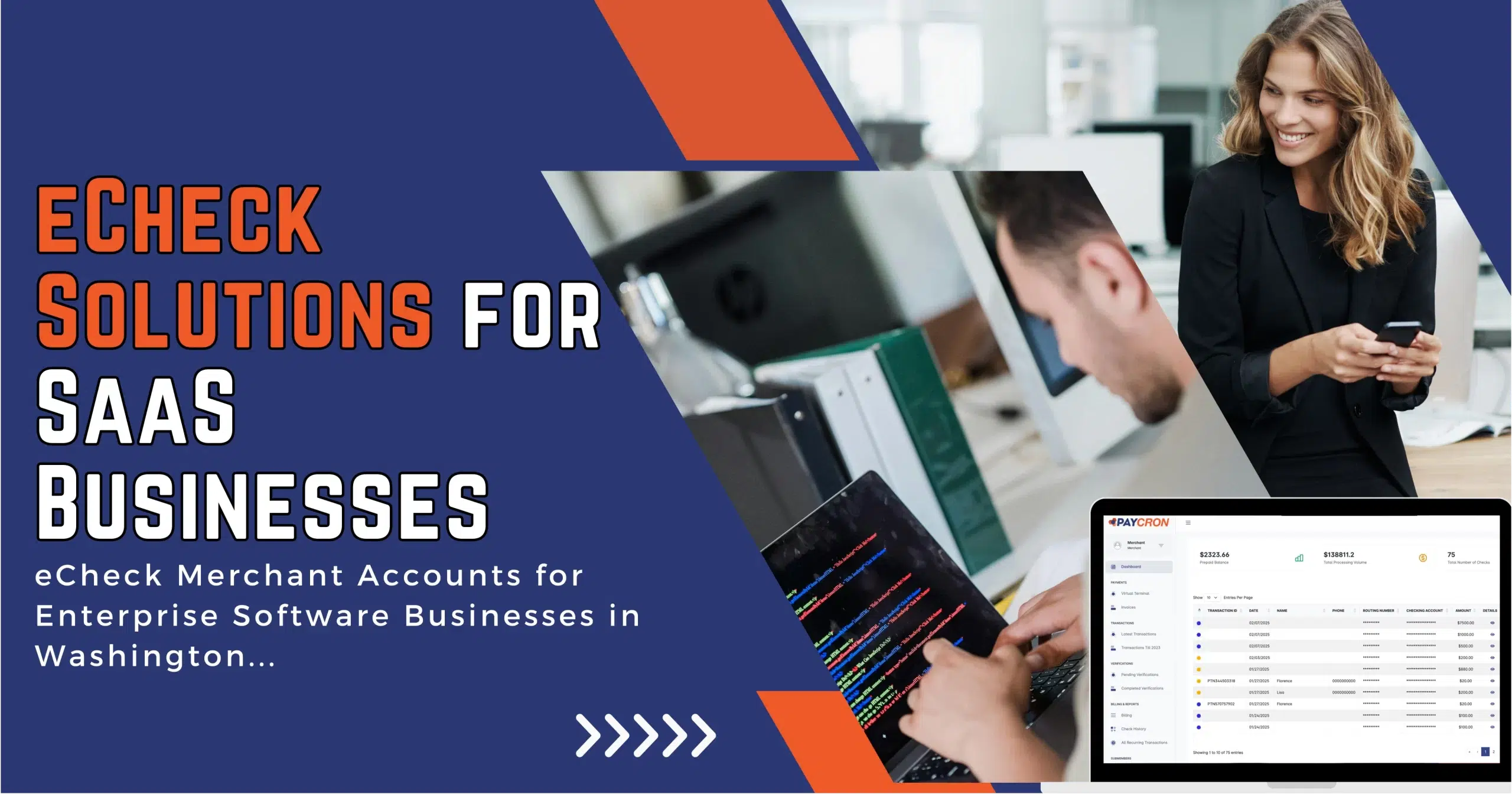
| May 20th, 2025 |
eCheck Merchant Account for Enterprise Software Businesses in Washington!
Summary:
This content explains how eCheck merchant account can benefit enterprise SaaS businesses in Washington, particularly SaaS and ERP providers. eChecks are a secure, cost-effective solution that reduces transaction fees, secure recurring payments, and handles high-volume B2B payments with fewer chargebacks. The post also covers fraud prevention, digital verification, and integration with CRM and ERP systems, providing a seamless and efficient payment process for Washington-based businesses.
Introduction —
Hey everyone! If you’re running an enterprise software business, like a SaaS (Software-as-a-Service) platform or an ERP (Enterprise Resource Planning) system here in Washington, then you know how important it is to keep your payment processes smooth, secure, and cost-effective. That’s where eCheck merchant accounts come in, and I’m here to break down why they’re a game-changer for your business.
What Are eCheck Merchant Accounts?
First off, let’s define what an eCheck merchant account actually is. It’s basically an electronic version of the paper check, but instead of writing a check and going through the physical banking system, payments are processed digitally through the Automated Clearing House (ACH) network. So, it’s direct, bank-to-bank transfer, and it’s way cheaper than traditional credit card transactions, especially for high-volume businesses like yours.
Step-by-Step Guidance for SaaS Businesses in Washington —
So, how do you get started with eCheck solutions? Here’s a simple breakdown for Washington-based enterprise software companies:
1. Choose the Right eCheck Payment Processor:
First, you’ll need to choose a payment processor that supports eChecks. When looking at options, focus on a few things:
- Low Fees: eCheck processing fees are usually much lower than credit card fees—typically a flat fee between $0.25 to $1.50 per transaction.
- Integration: Make sure your eCheck solution integrates easily with your current software systems—think CRM (Customer Relationship Management) and ERP (Enterprise Resource Planning).
- Security: Look for processors that offer top-notch security features, like fraud detection and digital verification.
2. Integrate eChecks with Your Systems:
Once you’ve chosen your processor, it’s time to integrate it into your payment systems. For SaaS and enterprise platforms, this means ensuring your CRM and ERP systems can handle recurring payments automatically and track financial data seamlessly.
3. Set Up Digital Verification and Authentication:
Security is key, especially when you’re dealing with customer payments. eCheck systems offer tools like multi-factor authentication (MFA) and digital signatures, which provide an extra layer of protection for both your business and your customers.
4. Automate Your Payment Cycles:
One of the greatest benefits of eChecks for subscription-based businesses is the automation of recurring payments. This helps you manage your cash flow better and reduces the risk of late payments, which is a huge win for SaaS businesses.
How eChecks Support Subscription-Based Models —
For those of you offering subscription services, eChecks are a natural fit. Here’s why:
- Automated Billing: With eChecks, you can set up automatic, recurring billing for your customers. Once they’re set up, payments will be automatically deducted on the schedule you choose—be it monthly, quarterly, or annually. This not only saves time but ensures a steady revenue stream.
- Cost-Effective: The lower transaction fees with eChecks mean you’re saving money every time a customer makes a payment. Over time, these savings can add up, especially for high-volume businesses.
- Faster Cash Flow: Payments typically clear in 1-2 business days, which is quicker than traditional checks and provides you with faster access to funds.
How eChecks Handle High-Volume B2B Payments —
For those of you in the B2B space, eChecks are incredibly effective. You’re probably dealing with larger transactions and a high volume of payments, which means the fees can add up fast when using credit cards. eChecks lower your transaction fees to about $0.25–$1.50, significantly reducing overhead costs.
Also, eChecks are much less likely to result in chargebacks compared to credit cards. This is because the ACH network is more secure and the transaction process is more transparent, making it harder for fraudsters to exploit.
Fraud Prevention, Authentication, and Digital Verification —
Speaking of fraud, eChecks are much safer than you might think. A lot of payment processors offer built-in fraud prevention tools like account verification, eCheck verification and bank-level encryption. Plus, digital signatures make sure that every transaction is legitimate, protecting both your business and your customers.
Technical Deep Dive for CTOs and Developers —
For the tech experts out there—whether you’re a CTO or a developer—integrating eChecks into your business systems can be straightforward, but it’s important to ensure smooth integration with your existing tools. Here’s how you can make it work:
- API Integration: Most eCheck payment processors offer APIs that allow seamless integration with your current CRM and ERP systems. This helps automate payments, track transactions, and keep everything running smoothly on the back end.
- Real-Time Notifications: Set up webhooks to get real-time notifications of payment statuses, so you’re always on top of what’s happening.
- Security Standards: Be sure to meet security standards like PCI-DSS (Payment Card Industry Data Security Standard) to ensure your system is safe from any data breaches.
Financial Transparency, Data Security, and Auditing —
eChecks also help provide better financial transparency. With full access to transaction histories, it’s easier to generate automated reports, which is crucial for tax filing, auditing, and financial tracking. Plus, with the added benefit of data encryption, sensitive customer and business information is protected, reducing the risk of security breaches.
eChecks vs. Credit Cards —
Here’s a quick side-by-side comparison of eChecks vs credit cards when it comes to enterprise software businesses:
| Feature | eChecks | Credit Cards |
| Transaction Fees | Low, around $0.25 to $1.50 | High, typically 2-3% per transaction |
| Chargeback Risk | Lower risk | Higher risk |
| Payment Speed | 1-2 business days | Instant or 1-2 days |
| Subscription Billing | Great for automated recurring payments | Works but can incur higher fees |
| Transaction Volume | Ideal for high-volume transactions | Expensive for high volumes |
| Fraud Protection | High (bank-level security) | Standard fraud protection |
| Security | Strong encryption, digital signatures | Standard encryption |
Conclusion —
So, there you have it! eCheck merchant accounts are a smart choice for enterprise software businesses here in Washington. They offer cost-effective payment processing, especially for subscription models and high-volume B2B transactions. The added fraud protection, security features, and seamless integration with your CRM and ERP systems make them a solid solution for optimizing payment cycles, improving cash flow, and maintaining financial transparency.
By leveraging eChecks, your business can stay ahead of the curve in Washington’s innovative tech ecosystem, all while saving money on transaction fees and reducing chargeback risks. It’s a win-win for the future of your payment processing!
